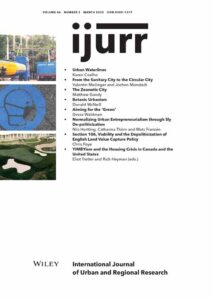Among a number of proposals regarding ‘late’ forms of urban neoliberalism, it has recently been argued that urban entreprenurialism has become ‘common sense’ or even ‘dull compulsion’. In this article, we contribute to this discussion by exploring the structural conditions and local strategies for normalizing city-centre-oriented urban entrepreneurialism in a Swedish context. In doing so, we return to an important but sometimes overlooked aspect of David Harvey’s original concept: the delicate act of organizing urban entrepreneurialism across public and private spheres of the local polity. From this perspective, the act of making urban entrepreneurialism normal is far from ‘dull compulsion’. Drawing on longitudinal case studies of two different public-private partnerships related to city centre development in the two largest Swedish cities, we highlight the active use of sly, or cunning, de-politicization strategies among local elite actors. Our analysis leads to the more general claim that we should expect similar sly de-politicization strategies to be necessary for normalizing urban entrepreneurialism in political contexts characterized by relatively strong local authorities, and in relation to spaces and topics of interest to many and diverse actors.
Details
Written by:
Nils Hertting, Catharina Thörn & Mats Franzén
Digital Object Identifier (DOI)
10.1111/1468-2427.13017
About DOI

